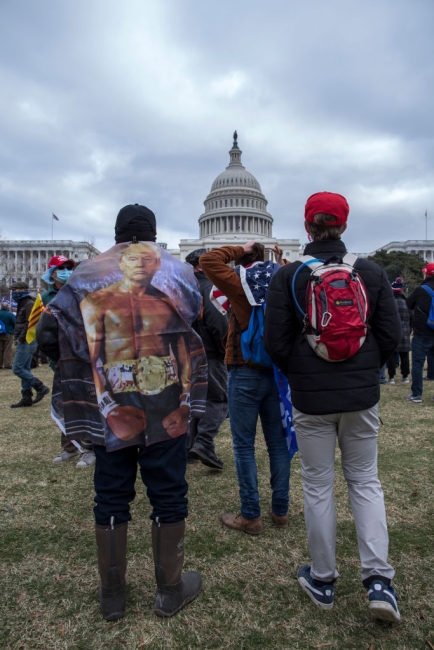You have /5 articles left.
Sign up for a free account or log in.

Protesters gathering at the U.S. Capitol
Anadolu Agency/Getty images
As a university president and a scholar of democracy, I can say unequivocally that our United States democracy is strong enough to survive a siege of our Capitol building. But our democracy shouldn’t have to prove it.
The weakness is not in our democracy, but in the hearts and minds of those who vandalized the Capitol, who ruthlessly attacked others and who interrupted democracy at work by threatening the lives of our legislators and the Capitol Police. We should all be reminded that the problem isn’t that one candidate lost, or that millions of people are disappointed that their candidate didn’t prevail. Democracy allows for loud disappointment -- even for sore losers. Their angry voices are welcome, their protests are permitted -- even when their opinions are counter to the opinions of those who are in power or about to assume it. Democracy requires some level of constant discomfort as we make room for a cacophony of voices and conflicting opinions.
But there is a line, and it has clearly been crossed. Democracy is predicated on the rule of law -- and on elected officials, citizens and the military following the law. Democracy is also built on the very basic understanding that each of us will agree to be governed by the people who are elected even when we don’t like or agree with them. Living in a democracy is the promise that our time -- or our party’s time -- may come in the next election. That was true four years ago, and it should be true this year as well.
Yesterday, the citizen rioters seizing our Capitol crossed over that line into the land of anarchy in a very visible way. The problem comes in the crossing of that line, and in everything that helped that mob to get there.
Let’s be honest with ourselves that many other citizens, elected officials and news outlets participated in enabling yesterday's siege. Finger-pointing, hate speech, scapegoating, unbounded presidential power … did anyone really believe that it would lead to nothing? Shame on all of us for every time we stayed silent when we knew better, for every time that we mindlessly forwarded a politically hyped email or TikTok without checking its veracity, for every time we rejected being friends with someone from another political persuasion, for every time we decided to stay in our own echo chamber and get our news from only one news source.
When lines are crossed, like today, leaders must speak clearly and loudly. Whether as the president of a club, a business, a labor union or a university, we always have a way to stand up and say “Enough! There is no room in this school/business/organization/political party/whatever for violence. There is no room for circumventing all that is at the heart of our democracy.” At the very least, a president should be the first to jump up to loudly and unequivocally say, “Do no violence in my name.”
But yesterday, “Enough!” had to be yelled from every corner of our country. I celebrate the many Republicans and Democrats who said it last night. In a time like the present, “Enough!” doesn’t belong to one political party, gender, race or state. It is the battle cry of all who value democracy in the face of a siege. There is one version of “Enough!” in the midst of the siege -- that is the moment to be passionate, firm and perhaps raw with our words and reactions. But in the days and months ahead, we must dedicate ourselves to deepening that sentiment. This is the time to rebuild trust in our democracy, to hold each other accountable, to demand better and more from our leaders, news outlets and political parties. This is a time for justice for all of America, because an attack on the U.S. Capitol is an attack on all America.
Educating Critical-Thinking Advocates
And to the rioter who broke into the congressional offices and left the “We will not back down” note, I want to say the following: beware the college-aged students and teenagers across this country. They will not back down, either. And their voices and collective action will drown out any damage that you have done. For the last decade, I have watched as our young people -- at Shenandoah University, in the local community and elsewhere -- have demanded a better country through peaceful, democratic protests and rallies while also eschewing violence and hatred. Thank goodness that their time for leading our country will come soon.
We faculty members and administrators in higher education all have a role in helping our students be critical-thinking activists for democracy. We must ensure that our students hear many different voices on any given topic, and that opportunities for deep dialogue happen not just in the classrooms and residence halls but also in cafeterias, commuter lounges, fraternities and sororities, and online.
We should ensure that students' curricular and co-curricular experiences connect them with the real world -- one in which there is a multiplicity of political voices and preferences. Our students need to know how to participate in society, how to listen and how to present their own ideas when they encounter lots of disagreement. Groupthink does not prepare anyone well for life outside our campuses and classrooms. As faculty and administrators, we should remember that nearly all foundational and disciplinary skills and knowledge that students develop in college can play a key role in supporting democracy -- or in tearing it down.
Finally, we should abandon any pretense that all ideas are equal. They are not. We should demand that ideas are articulated and defended in meaningful ways that are grounded in science, data, knowledge of history and a commitment to bettering humanity.








